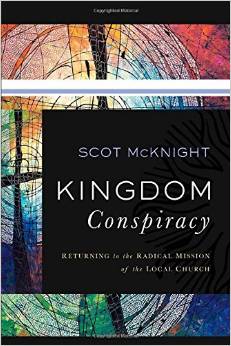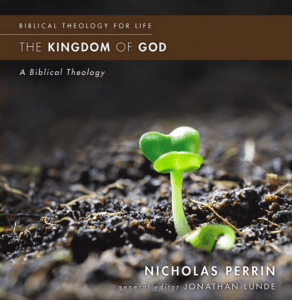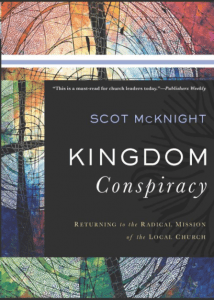 The following post is my set of notes for a lecture I give that plays off of Jeff Foxworthy’s famous humorous introductory line, “You may be a redneck if…”. This post then is about “You may be a kingdom mission church if…”
The following post is my set of notes for a lecture I give that plays off of Jeff Foxworthy’s famous humorous introductory line, “You may be a redneck if…”. This post then is about “You may be a kingdom mission church if…”
The lines are not expounded so there are just notes and lines about ideas that deserve development.
So kingdom theology shapes kingdom mission and these are formed by kingdom spiritual disciplines.
1. When the cruciform character of King Jesus shapes every major dimension of your local church.
The character of a king determines the character of a kingdom.
Leaders help to form a culture.
Kingdom leaders are instruments for forming a kingdom culture.
Major text: Phil 2:6-11
The titles for Jesus all tell the same story and each is Jesus’ job description:
Son of man: Mark 10:35-45 and 14:62
Son of God: Matt 3:17; 17:5; Mark 15:39
Messiah: Mark 8:27-33
Story? He lived, he died, he was raised. The crucified one is exalted.
2. When your church perceives itself as a people redeemed and rescued from the world and evil by king Jesus.
The Bible’s story is a story of redemption: from sin and sickness and systemic evil.
This redemption occurs through atonement (cross-shaped redemption).
Kingdom mission churches are redeemed and redemptive communities.
Holistic redemption.
Important texts for teaching in the local church:
1. Miracles/exorcisms of Matthew 8—9 as redemptive healings.
2. The cross as atoning: Mark 10:45; 14:24
3. The Spirit unleashed: Matthew 12:28; Acts 2; Eph 5:18.
3. When your church knows it is governed by Lord Jesus.
The major titles for Jesus are lordly titles: Son of man (Daniel 7), Son of God (2 Sam 7; Psalm 2), and Messiah (=Israel’s king in the Age to Come)
Acts 2:36 may tell the whole Bible’s story in one verse.
Acts 10:39-40
Col 1:15-20
“Body of Christ” (1 Cor 12)
We need to recapture the Lordliness of the Lord over the church.
The temptation for all leaders is to be lord. A kingdom mission church makes clear that Jesus is the Lord of and in this house.
4. When your church challenges the lordless lords of our culture and country. (Barth’s expression)
Postmodernity’s greatest insight: we are all complicit in our culture.
Education, economics, lifestyle, understanding of love, hopes.
Kingdom theology challenges the lordless lords.
Probe where the lords are lurking in your community. Steve Wilkens, M. Sanford, Hidden Worldviews.
Good texts for consideration: Col 2:6-7; 2 Cor 10:4; the narrative from Revelation 17—22 (Babylon’s wealth is “repurposed” for the glory of God in the new Jerusalem).
Remember the gospel: 1 Cor 15:3-5
5. When your church seeks to be a kingdom kind of community.
Identity formation: we are a kingdom outpost.
6. When your church is known above all for loving one another and loving your neighbors.
Love defined: not by dictionary but by God’s love in the Bible.
Four elements:
- A rugged commitment to someone (= “covenant”)
- To be “with” someone.
- To be “for” someone.
- “Unto” Christlikeness (kingdom transformation)
Kingdom mission churches are known for love.
7. When your church establishes justice and peace within the local fellowship and then extends that justice and peace into the community.
Specific in mind: our tendency to want justice somewhere else (in our community, in our state, in our nation, in the world in some stricken place).
A kingdom mission church first works for justice and peace within that local church.
By learning the ways of justice and peace at the ground level we can extend that into our community, state, nation and world.
Thematic verse: Gal 6:10. (Biased toward the people of God.)
8. When your church cannot avoid being people of “good works” in the public sector.
The NT’s term for “social justice” or public acts of service is “good works.”
Good works is the way people of love, justice and peace in the kingdom live so they cannot not extend such a kind of life to others.
Tim Keller’s idea that “justification” ought to lead to “justice” is right. (In Generous Justice.)
Principal texts: Matt 5:13-16; 1 Peter 2:11-12; then 2:14, 15, 20; 3:6, 17; 4:19.
9. When your church becomes “sacred space” or “kingdom space” in your community.
Extending land as God’s dwelling place into our spaces: home, neighborhood, church, community.
10 When your church’s spiritual disciplines foster these themes.
A question now for you to ponder as you go home: what spiritual practices or disciplines do we need to practice to foster this kind of kingdom mission church?
As you travel home, perhaps with others, strike up a conversation about this: what disciplines actually promote kingdom church mission?
How to think about it? Begin with these 9 themes, add to them or subtract them, but ponder what kingdom is and what it can be now and how we practice our faith to create these nine elements.
I’m an advocate for “spiritual disciplines” but far too often they are designed for individual spiritual formation, so much that some of the gurus in our own spiritual formation tradition did not and do not participate in a local church.
So I ask: what spiritual disciplines are we to develop that will lead to kingdom mission churches?
Two recommendations:
Barry Jones, Dwell
David Fitch’s next book (IVP perhaps late 2015).











